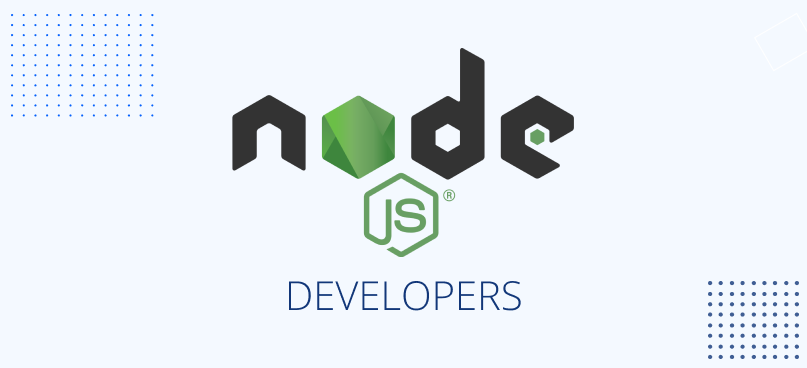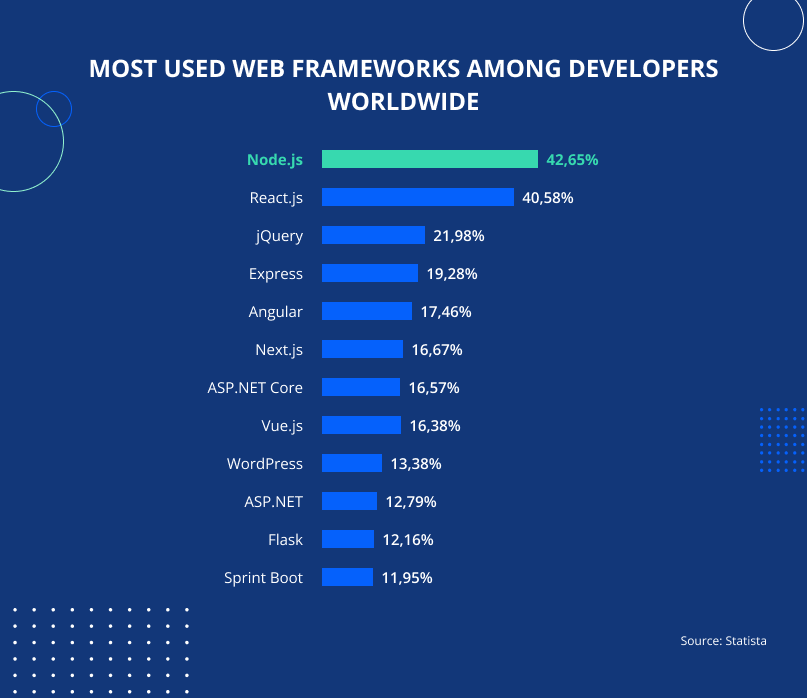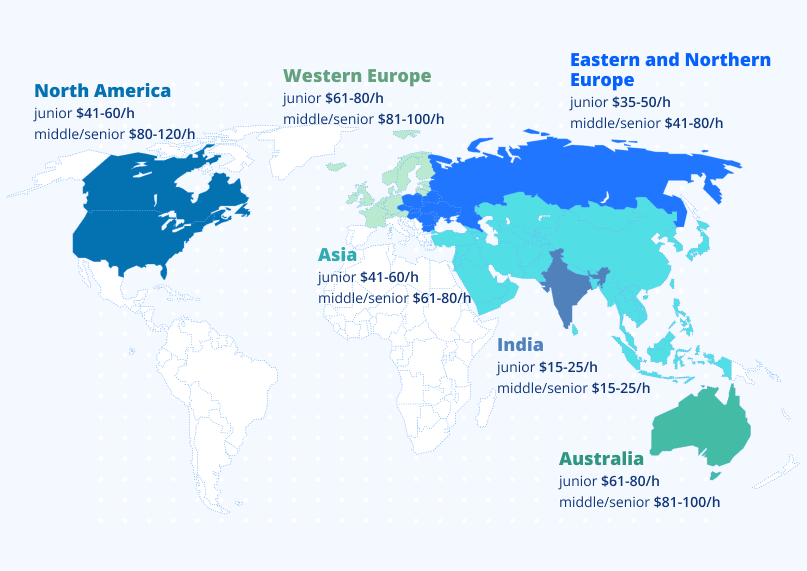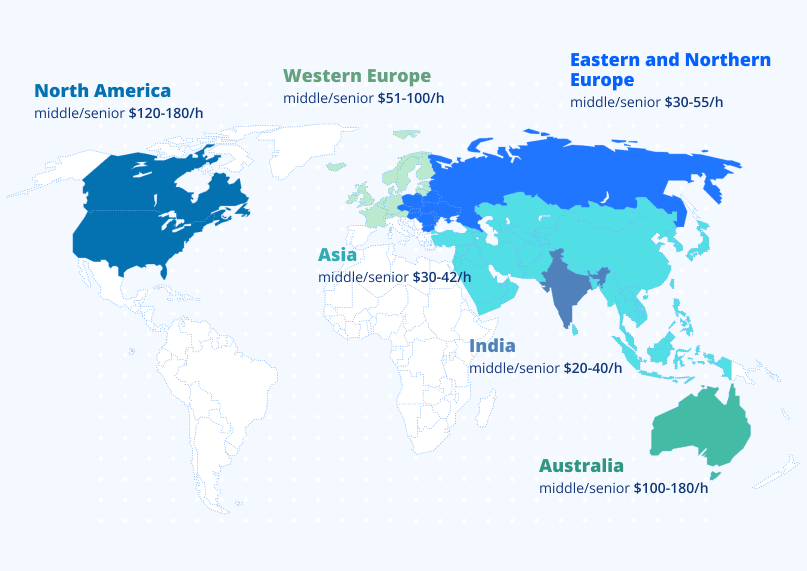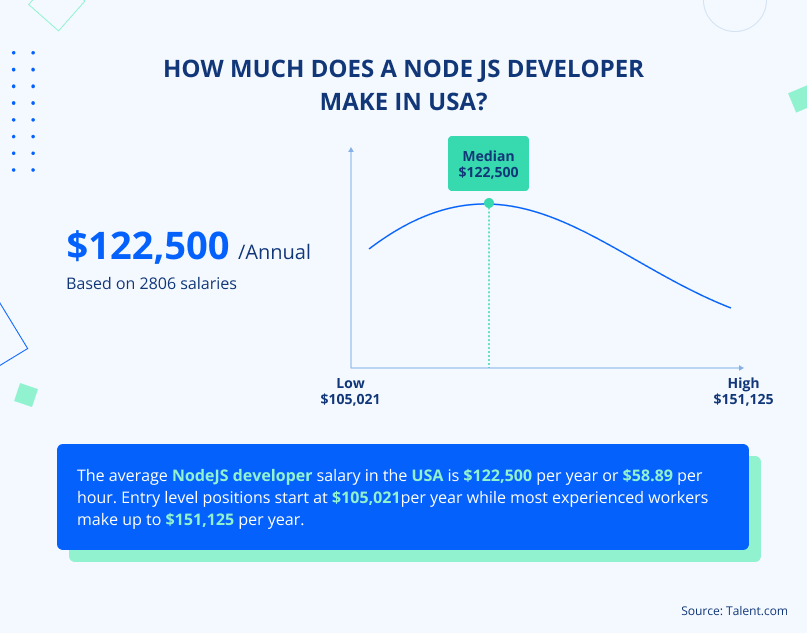- 1. What is Node.js?
- 2. Hire a Node JS Developer: Short Overview
- 3. Hiring Node.js Developer: Requirements and Responsibilities
- 4. Node.js Developer Skills
- 5. Step-by-Step Guide on How to Hire a Node.js Developer
- 6. How Much Does It Cost to Hire a Node JS Programmer?
- Your Turn to Hire Node.JS Developers from JayDevs
What Is Node.js?
Is Node.js a programming language?
- No, Node.js is not a programming language.
- Node.js is also not a framework.
Node.js allows to develop server applications using JavaScript. In practice, Node.js is a software platform based on the V8 engine that converts JavaScript to machine code.
V8 is a Google engine with open-source code, developed with С++. The goal of the V8 is to increase JS execution efficiency in web browsers.
For the first 20 years, JavaScript was mainly used to write client-side code. Since JavaScript could only be used for front-end development, programmers had to work with other languages and frameworks to create back-end components. Since Node.js surfaced, it has become a runtime environment that includes everything required to run a program written in JavaScript.
According to Statista findings, Node.js ranks among the most used libraries, frameworks, and tools.
Hire Node.js Developer: Short Overview
- As of now, Node.js has over 101 thousand stars on GitHub, which is constantly growing.
- In the Stack Overflow 2022 survey, Node.js scored 46.31% in popularity among frameworks. In 2023, the numbers slightly dropped to 42.65%, but the technology is still in the first place.
- On indeed.com, there are now almost 10,000 job offers for Node.js developers worldwide.
The wide use of this environment can explain the growing demand for Node.js programmers. Node.js can be used in API development, IoT applications, chatbots, real-time collaboration tools, and much more.
Benefits Of Hiring A Professional Node JS Developer
“What sets Node.js apart is the ecosystem we have around it,” says Tracy Hinds, education community manager of the Node.js Foundation. “Node.js is open-source; it’s the core language that lives on the server side, and JavaScript lives on the website. That means there’s a pretty good chance, no matter what your language, that you’ll use JavaScript at some point if you’re developing for the web.”
So, thanks to Node experts, you can create almost anything ranging from messaging applications to IoT applications. Node.js is the first choice when it comes to web app development or app development, thereby receiving numerous benefits in the process, such as:
- Excellent performance and scalability
- Cross-platform development
- Ability to handle multiple requests
- Rich ecosystem
- First-class prototyping capabilities
- Complete and test all aspects of a web application quickly.
Hiring Node.js Developer: Requirements and Responsibilities
When you hire Node.js developers, you should consider the tasks they will fulfill. Probable tasks might include:
- Developing server-side logic.
- Ensure high performance and responsiveness to requests from the front end and integrate the front end elements into the application.
- Connect back-end code to the front-end, creating new internal and public API endpoints and modifying existing services to support additional functionality.
- Maintenance of the central database.
- Work with cloud-based services.
- Writing and execution of unit tests.
Node.js Developer Skills
Skills are divided into soft and technical. More specifically, soft skills are required to make the working process efficient. Technical skills, on the other hand, are directly linked with application development.
Node.js Developer: Soft Skills Review
A soft skills interview stage is needed so that you can understand the candidate’s personality and check his communication skills, ability to cope with difficulties, critical thinking, and ability to work in a team.
Check whether the candidate’s values align with the company’s values.
Additionally, clients assess whether the developer fits the requirements and goals set forth by the company, demonstrates a commitment to achieving those objectives, and exhibits strong team collaboration skills.
To expedite the vetting process and minimize time spent, prioritize soft skills interviews initially. This approach allows you to identify candidates whose attributes align with business requirements, eliminating the need for technical skills testing.
Junior Node.js Developer: Technical Skills
Junior engineers typically have one year of experience. With this experience, junior Node.js programmers should be familiar with Node.js LTS documentation and have a solid knowledge of JavaScript (i.e., promises, async programming, classes, functions, and other aspects of JS).
Regarding the back end, your junior Node.js specialists should understand how to connect to third-party payment services.
A Node.js junior developer should also be familiar with HTML5 and CSS3 technologies. These professionals should know how to work with Node.js frameworks, including Express, Nest, and Fastify. Node.js developers can use these frameworks to write RESTful APIs.
In addition, newcomers should understand the basics of testing, such as how to write unit tests.
Knowledge of databases is also essential, so developers should understand the basics of NoSQL (e.g., MongoDB and Redis), SQL (e.g., MySQL or PostgreSQL), and other popular ORMs such as Sequelize, TypeORM, and Mongoose.
Strong junior Node.js developers also know how to work with Passport.js and can implement, for example, the passport-jwt strategy.
Middle Node.js Developer: Technical Skills
Middle Node.js developers usually have over three years of experience. They have more in-depth skills than the junior programmers mentioned above.
They should also be familiar with modern JS tools, including TypeScript.
Additionally, knowledge of CI pipelines (e.g., CircleCI or AWS CodePipeline) is a plus for the average Node.js developer.
Senior Node.js Developer: Technical Skills
Senior Node.js developers have over five years of experience. In addition to the tools and skills listed above, they have more advanced specifications related to Node.js. For example, senior experts typically also have experience with client-side frameworks such as Vue, React, and Angular.
Some requirements apply to all levels. For instance, all Node.js programmers must write effective code that complies with standard practices. In addition, your programmers must be familiar with best practices, code conventions, and code performance optimization.
They should be proficient with bug investigations and fixing, databases, and experience with cloud providers (e.g., AWS, Azure, GCP), experience with microservices architecture, and experience optimizing and refactoring pre-written code.
Top 10 Node.js Packages Every Developer Needs To Know
When developers are engaged in their work and encounter the need to implement commonly used functions, they often rely on ready-made solutions for efficiency. These solutions are typically packaged into libraries or modules, which allow for easier integration and utilization of pre-existing functionalities. Essentially, a package serves as a collection of functionalities designed to streamline coding processes and enhance productivity.
Node.js engineers benefit from over a million packages with open-source code available in NPM (Node Package Manager). The most popular packages lie at the base of many applications. The 2018 NPM report findings state that 97% of application code is created with npm packages. Therefore, a developer doesn’t need to write code for thousands of modules, which saves hours of development time.
When you hire Node.js app developers, they should be familiar with the most popular npm packages. Let’s briefly go over 10 of them:
Lodash – A utility library that makes JavaScript more accessible by taking the hassle out of working with arrays, numbers, objects, and strings.
Weekly Downloads: More than 48 million
Chalk – A third-party library that can be used for styling texts and creating your themes in a Node.js project.
Weekly Downloads: More than 279 million
Commander – A complete solution for Node.js command-line interfaces.
Weekly Downloads: Over 131 million
Bluebird – A fully-featured promise library focusing on innovative features and performance.
Weekly Downloads: More than 26 million
Async – A module with powerful utility functions for working with asynchronous JavaScript.
Weekly Downloads: More than 52 million
Express – A fast, unopinionated, minimalist web framework for Node.
Weekly Downloads: More than 28 million
Gulp – A streaming and fast-build system that favors code over config.
Weekly Downloads: More than 1.3 million
Webpack – A module bundler. The primary purpose of a webpack is to create a bundle of javascript files to be used in the browser.
Weekly Downloads: More than 25 million
Jest – A javascript testing framework designed to ensure the correctness of any JavaScript codebase.
Weekly Downloads: More than 22 million
Debug – A tiny JavaScript debugging utility modeled after Node.js core’s debugging technique.
Weekly Downloads: More than 237 million
If you wish to dive deeper into NPM packages, we recommend that you directly visit Github. There, you can study the specifics of the packages that may assist you with your mobile or web apps.
Step-by-Step Guide on How to Hire a Node.js Developer
Follow our step-by-step guide on hiring the best Node.js developers:
Step 1: Create a clear job description
Create a clear job description showing potential engineers your requirements, responsibilities, and the benefits you offer.
- Briefly describe your company
- List the technical requirements for the candidate (i.e., education, experience, technology stack, and portfolio)
- List the soft skills required for the job position
- Provide details about the tasks expected from the Node.js programmer each day
- List the benefits of working for your company
The job offer should illustrate the culture and values of your company, as this will be your first filter for candidates.
Step 2: Searching for candidates and ways to hire a Node.js developer
In-house Node.js Developer
If you’re considering hiring an in-house Node.js Developer, it’s important to understand the context of two models of engagement: traditional in-house hiring and tech recruiting – custom in-house hiring:
- Traditional in-house hiring: If you opt for traditional in-house hiring, you’ll be responsible for paying the developer a monthly salary along with all associated financial benefits. This model involves the classic approach to hiring where the developer becomes a direct employee of your company. However, this method entails a labor-intensive hiring process, including sourcing, interviewing, and onboarding.
Custom in-house hiring through tech recruiting: Alternatively, you can explore custom in-house hiring through tech recruiting services. This approach involves leveraging specialized recruitment companies or platforms to find and onboard developers tailored to your specific business requirements. While this model may incur fees for successful candidate placement, it offers advantages such as streamlined hiring processes and access to a curated pool of skilled developers.
Freelance Node.js Developer
Freelancers seem to be the most attractive option. There are lots of freelancers and lots of resources to access them. However, hiring Node.js developers in this way can be quite risky. You can’t get direct access to Node experts; there’s the possibility of missed deadlines, late responses to your questions, and not being fully immersed in your product due to freelancers working on multiple projects simultaneously.
IT Staff Augmentation and Dedicated Development Team Company
As businesses seek to augment their IT staff or assemble dedicated development teams, accessing qualified Node.js developers become crucial. Hiring Node.js developers from specialized companies with experienced engineers and professionals can help bridge skill gaps.
Opting for a dedicated development team is particularly advantageous when businesses require a self-directed unit capable of driving project development independently. This approach is especially beneficial when organizations lack an experienced developer with the requisite skills to lead a team effectively. The popularity of this option stems from its ability to tap into a diverse talent pool, offering expertise in various domains and competitive cost structures.
Step 3: Prepare for the interview
Interviews usually involve two phases: the HR interview or soft skills interview and the technical interview. What’s the difference?
The HR interview or soft skills interview is when you can test the developer’s English language level and communication skills. Therefore, prepare a list of questions that will allow you to assess how the candidate is able to work in a team, their ability to meet your deadlines, and whether they know about the latest trends in Node.js development. For example, inquire about the latest web developer trends.
The technical interview checks whether the Node.js engineer can meet your technical requirements. It’s important that the person conducting this phase of the interview is technically savvy. If you lack strong technical knowledge and don’t have a CTO-type person available to conduct the interview, your best option is to hire Node.js developers through a specialized recruiting or IT staff augmentation company.
How Much Does It Cost to Hire a Node JS Programmer?
We will show you a rough estimate of Node developers’ hourly rates to help you choose the right region and approach.
Node.js Developers’ Hourly Rates
Hourly rates for junior, middle, and senior Node.js experts:
Hourly rates for outsourcing and dedicated software development companies may differ. We have collected data from websites like GoodFirms and Clutch and derived aThe hourly rates for IT staff augmentation companies may vary. We have collected data from websites such as GoodFirms and Clutch to derive approximate hourly rates for different regions.
Node.JS developers’ Average Salary
Factors such as years of experience, hiring model, and location influence individual engineers’ rates. Therefore, the annual salary of Node.js developers varies from $105,050 to $151,125.
Consider the budget you plan to spend when you want to hire a Node.js developer.
Based on the data from Neuvoo and Glassdoor, we provide Node.js Developer annual salary (US average annual salary without additional cost).
Your turn to hire Node.js developers from JayDevs
We’ve previously written about how hard it is to find and hire the best Node.js developers. But now you know where to look, what to look for, how to inform your requirements, and more.
When you hire a Node.js developer through Jaydevs, you unlock significant benefits. As a prominent tech recruitment and IT staff augmentation firm based in Lithuania, our company boasts a pool of highly skilled professionals. With 93% of our developers classified as senior Node.js experts or higher, you can rest assured of accessing top-tier talent.
Regardless of your specific requirements, our specialists, including our Node.js developers for hire, are dedicated to providing unwavering support for your business needs. We prioritize regular communication with clients and stay abreast of the latest trends in technology and talent acquisition.
Reach out to us today to tap into the expertise of our Node.js specialists and elevate your business endeavors to new heights.






